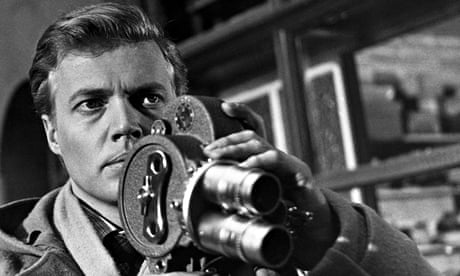Among contrasting roles in the career of the actor Karlheinz Böhm, who has died aged 86, were a romantic portrayal of Emperor Franz Joseph of Austria in the hugely popular trio of Sissi films (1955, 1956, 1957), the creepy title role in Michael Powell's Peeping Tom (1960) and unsympathetic characters in the films of Rainer Werner Fassbinder in the 1970s. In addition, as befitted the son of the great Austrian conductor Karl Böhm and the soprano Thea Linhard, he portrayed Schubert in Blossom Time (1958) and Beethoven in The Magnificent Rebel (1962).
Born in Darmstadt, Germany, where his father had recently been appointed director of music, Böhm studied philosophy at the University of Graz, Austria. Although his parents arranged for him to take piano lessons at an early age, he was not interested in a musical career, and instead pursued his passion for acting. So, in 1948, he went to Vienna to work as assistant to the director Karl Hartl on The Angel With the Trumpet, in which he also had a bit part.
Böhm's first leading role was in 1952 in Alraune (Mandragore), the fifth version of Hanns Heinz Ewers' novel of a child born to a prostitute by artificial insemination from a hanged man, who grows up to be a soulless femme fatale. Böhm, boyishly naive, falls in love with Alraune (Hildegard Knef), the creation of his mad scientist uncle (Erich von Stroheim). It began a series of roles for Böhm as a handsome, rather wooden juvenile lead in a number of insignificant films during a particularly fallow period of German cinema.
Then came Sissi (1955), in which Böhm played Franz Joseph opposite Romy Schneider's Princess Elizabeth of Austria. This was followed by Sissi, the Young Empress (1956) and Sissi: The Fateful Years of an Empress (1957). These kitschy Technicolor costume dramas, part operetta, part Hollywood-style biopic, proved immensely popular, and Böhm became a matinee idol.
Therefore, many filmgoers were shocked to see him in Powell's disturbing thriller Peeping Tom (1960) as a serial killer of women, who records the fear and dying contortions of his victims on film. Böhm (whose slight German accent went unexplained) was Mark Lewis, whose childhood is haunted by his sadistic psychologist father (played by the director). Powell cast Böhm, because he thought he might know what it was like to be the son of an overbearing father. Böhm's performance is the more chilling because the character is ostensibly a normal young man with whom the audience can identify.
The critical outrage against the film almost finished Powell's career, while for Böhm it began a new phase in English-language films and more international recognition. He played a French journalist hanging around a seamy Soho strip club, in Too Hot to Handle (1960), featuring Jayne Mansfield; one of the storytelling brothers (the other was Laurence Harvey, very different in looks and accent) in The Wonderful World of the Brothers Grimm (1962); and an SS officer in Vincente Minnelli's leaden The Four Horseman of the Apocalypse (1962).
It was for Walt Disney Productions that he appeared as a brooding and intense Beethoven in the highly fictionalised The Magnificent Rebel. One risible scene had Beethoven getting inspiration for the first notes of his 5th Symphony from the landlord rapping on his door to ask for the rent.
Most of his subsequent films did little for his image, appearing as he did as charming villains in the fluffy Come Fly with Me (1963) – as a German baron using a flight attendant (Dolores Hart) for his smuggling plans – and the tepid spy spoof The Venetian Affair (1967). During the same period, he directed a few operas, including Elektra in Stuttgart and Tosca in Graz.
In 1968, a change came about the hitherto apolitical Böhm, prompted by the birth of the German student movement that year. "I was acting in Frankfurt at the time," he recalled. "I was sitting in a trendy bar when a group of demonstrators went past. I couldn't understand what made a bunch of young, well-off people take to the streets. But I started asking questions, and could see that we all have to take a moral and ethical stand."
A few years later, he met the radical film-maker Fassbinder, who deepened aspects of Böhm's screen persona in four films. In Martha (1974), Böhm, as a brutal husband, brilliantly displays the sadism that was masked in Peeping Tom. He is a world-weary counsellor in Effi Briest (1975), a smooth antiques dealer in Fox and His Friends (1975) and a manipulative wealthy communist in Mother Küsters Goes to Heaven (1975).
In 1981, Böhm was a celebrity guest on the popular television game show Wetten, dass…? (Wanna bet?) and bet that fewer than one in three people watching would donate at least one deutschmark or one Swiss franc to Ethiopia, the world's third-poorest country. As a result, he raised the impressive sum of 1.2m marks, and went on to establish the charitable organisation Menschen für Menschen (People for People), raising money for the people of Ethiopia. Ten years later, in 1991, Böhm married (as his fourth wife) Almaz Teshome, an Ethiopian archaeologist. She later served on the board of the charity, becoming its chair in 2011.
Böhm was made an honorary Ethiopian citizen in 2001. "Because they have recognised I didn't come as a stranger, to show them what they have to do to get out of their poverty," he explained. "No. I tried to find out what the people are missing, and how they can help themselves. My heart has become deeply Ethiopian in the deepest sense of the word. I don't live only for myself any more, but I live for other people."
Among Böhm's several awards was the Berlinale Camera at the 2008 Berlin film festival. He is survived by Almaz , their two children, and five other children from his previous marriages, who include the actor Katerina Böhm.

Comments (…)
Sign in or create your Guardian account to join the discussion